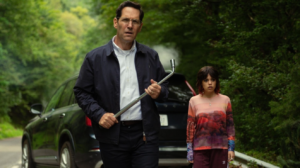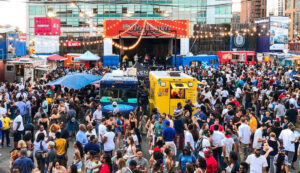“Being Autistic is an Experience Unlike Any Other”: This Autism Awareness Month, We Need More Stories Like Mine

Image Courtesy of Lamoureux Family
By Justin Lamoureux
I know in the last few articles, I’ve talked mostly about the challenges and tribulations of being an autistic person. As I conclude this series, however, I think it’s important to examine things in a different light. It is true that I faced many difficult situations over the years as a result of my disability, but I don’t mean to give the impression that my experiences growing up on the spectrum were all bad.
Or that I never found love and acceptance in my childhood community. That gross overgeneralization couldn’t be any further from the truth. I’ll give you an example: My days as a student in special education introduced me to a number of wonderful people who I likely would never have met otherwise. Teachers, paraprofessionals, counselors—the list goes on. In fact, I’m still in touch with many of these individuals today.
The adults in my school did more than support me academically; they also nurtured my interests. When my elementary school speech pathologist went out for Chinese food with her family, she picked up a takeaway menu just for me. It definitely made my pretend “Chinese restaurant” in the corner of my kindergarten classroom a lot more lifelike. When my school psychologist took a vacation, there were always plenty of pictures for us to look through when she got back… this woman visited some pretty awesome places, too. I was also the first person to see my principal’s new Volkswagen: We always loved talking about cars when she stopped by my special education classroom (I’d like to note: she was a regular guest).
My teachers also provided me with a shoulder to lean on when things got tough. In middle school, when the cafeteria was too loud, my special education teacher was right down the hall, her office door wide open. For almost two years we ate lunch together almost every day. If she couldn’t be there for me, she made sure that someone else was. We had a really special connection… one you don’t find with too many people. In retrospect, these kinds of relationships are so much better—and more meaningful—than ones I could’ve forged with other kids.
Besides, I made true friends when I got to college.
I befriended the kinds of people who are always happy to see you at club meetings and look forward to spending time with you. People who are happy to pose for pictures with you and aren’t self-conscious if you’re seen together on social media. People who gladly eat dinner with you at the same time—and quite often, at the same table—most nights. I’ve even met people who will stay up half the night when you get sick in their room (and fall asleep on the couch), then make sure you get home safely… they don’t care if it’s out of the way. And yes, even the occasional person who surprises you with a “prom-posal” to an upcoming dance.
Even though I’ve hit a few bumps in the road, I can honestly say that I’m quite pleased with how my life has turned out. I have made it to college and live independently. I have found a community of peers that is exactly like the one I so longed for during my teenage years, perfectly situated in my dream city. As a university student, I’ve also experienced more academic success than I could have imagined. While I still have a ways to go, I’ve got every reason to believe that my future is bright.
Even if I have yet to reach my final destination, I believe the time has come to share my story.
I’m doing this for a simple reason: to help foster a better understanding of autism in our campus community. The societal ignorance surrounding autism is hardly rooted in a lack of concrete knowledge—far too often, it simply lacks a relatable human face. Autism is such a misunderstood disorder because few individuals personally know someone who they can reference when trying to understand what it means to be autistic.
Hearing about the experiences of a high-functioning friend who shares your activities, classes, or residence hall can teach you a lot more about autism than watching a non-verbal toddler meltdown at the grocery store, or scrolling through an endless barrage of social media posts—shared by random accounts—containing facts that barely touch the foundation of knowledge regarding the disorder.
As I’ve made clear, “Autism Awareness” doesn’t exactly help matters, either. In fact, Autism Speaks has adopted an advertising platform that demonizes autism and portrays autistic people themselves as inherently problematic. Try creating a world that understands—or supports—people with a certain condition when they have been exposed to nothing but lies and raw hatred. If you ask me, “Autism Acceptance” is the only real way to foster an environment where individuals on the spectrum feel heard, understood, and supported.
Being autistic is an experience like no other.
It carries an incredibly prolific kind of pain: that of being “different.” The (oftentimes) immense social stigma, as well as the constant “ups” and “downs” of navigating daily life with this disorder, places autistic individuals (and their families) on a never-ending emotional rollercoaster. I often say—and truly believe—that to fully understand this as a non-autistic person, you either need to be the parent or sibling of someone on the spectrum. Being part of a so-called “autism household” gives you a front-row seat to everything I have described. When you are emotionally connected to someone with autism, it’s hard not to struggle with that pain yourself. It all becomes a part of your story, too.
For all the grief and uncertainty, though, life with autism has a unique silver lining: you see the world in a completely different way. It opens your eyes to a host of experiences and ideas that few others get to see. Many autistic people have solved problems nobody else could, and facilitated societal innovations that were previously unthinkable. In that sense, autism is not a disability. It is a gift.
This is why the world needs more stories like mine. There needs to be a stronger dialogue about life on the spectrum. When that happens, autistic people who have managed to overcome the adversities presented by our disability should take the front seat. Our society recognizes that autism is a spectrum—and that it encompasses a broad variety of behaviors, experiences, and outcomes—but we consistently fail to show people how this looks in their community. We need to familiarize autism—not just as a diagnosis, but as an experience.
I hope my story can do just that.





